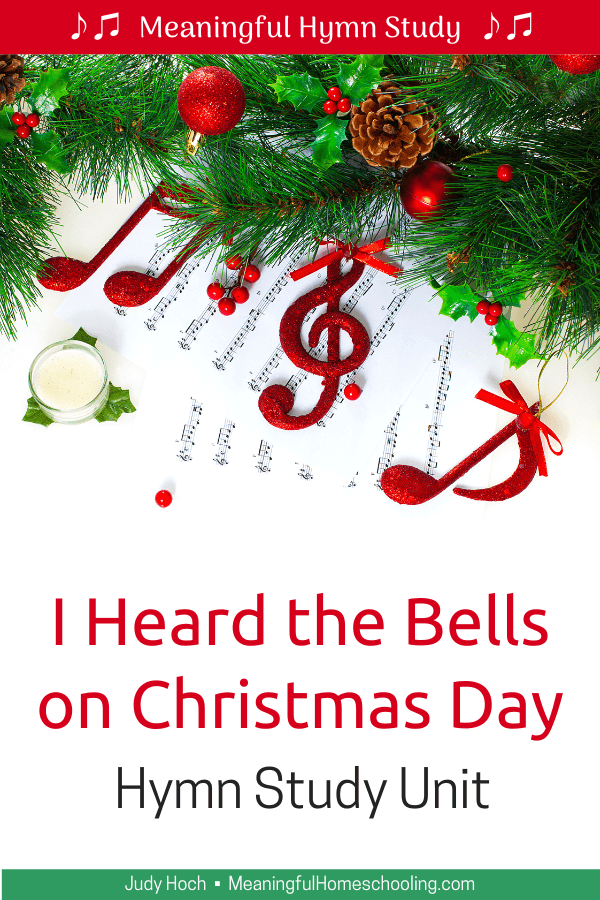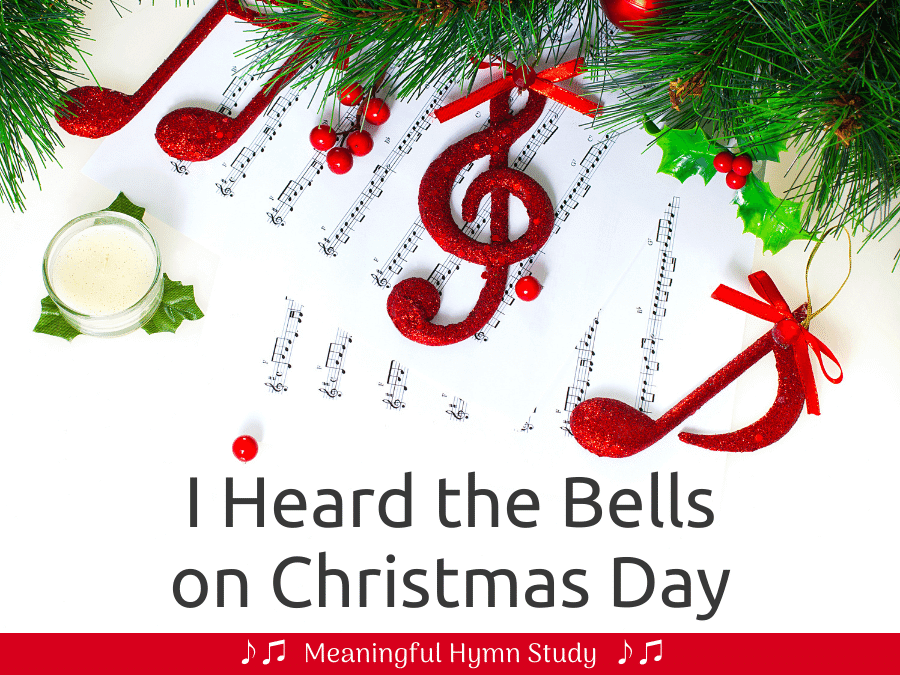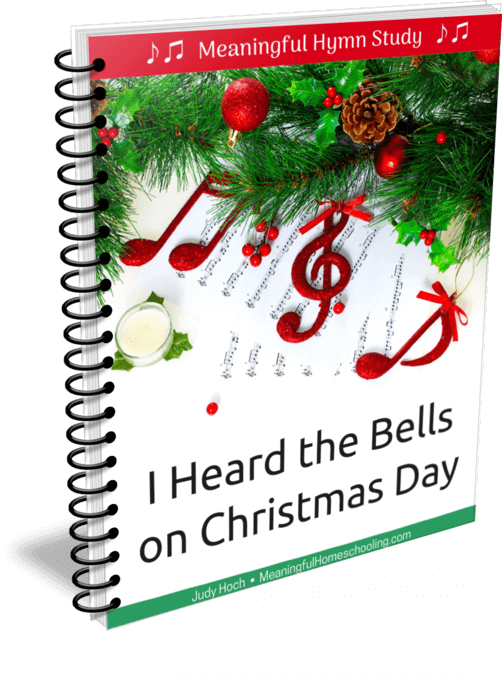I Heard the Bells on Christmas Day Hymn Study
This I Heard the Bells on Christmas Day Hymn Study includes everything you need to study the hymn in one easy download.

Hymn study is a simple way to pass the heritage of hymns on to our children. Use this unit study to help your family learn more about the hymn “I Heard the Bells on Christmas Day.”
I Heard the Bells on Christmas Day Hymn History
The beautiful words of “I Heard the Bells on Christmas Day” were written by Henry Wadsworth Longfellow as a poem of hope on one of his darkest days.
On that day in 1863, America was in the middle of the devastating Civil War. Mr. Longfellow, a staunch abolitionist, was heartbroken about the division between the North and the South.
At the same time as the country was being torn apart by war, Mr. Longfellow was also going through a time of deep personal sorrow.
Two years before, his second wife’s life had been tragically cut short. She had been sealing envelopes with hot wax, when somehow her clothes caught on fire. Longfellow rushed to smother the flames, but unfortunately she had been severely burned.
She passed away the next day. Mr. Longfellow was badly burned himself and was unable to attend her funeral.
This great loss caused Longfellow to sink into depression. His physical appearance changed as well as he grew his beard to cover the disfigurement of his burned face. He would wear a beard for the rest of his life.
On Christmas Day in 1862, the saddened man wrote in his journal, “‘A merry Christmas’ say the children, but that is no more for me.”
Then a few months later, in March of 1863, Longfellow’s son Charley ran off to enlist in the Union Army against his father’s wishes. On the first day in December, Mr. Longfellow was eating a meal when a telegram arrived with the sad news that Charley had been seriously wounded in a battle in Virginia.
Mr. Longfellow immediately traveled to Washington to pick up his injured son. They arrived back home together on December 8.
Mr. Longfellow was undoubtedly feeling solemn on that Christmas Day in 1863. The injustice and violence that surrounded the Civil War, as well as his own personal trials, left him feeling discouraged.
That day, though, he heard the sound of bells ringing in celebration of Christmas. Somehow those bells spoke a message of hope to his troubled heart—hope that there would again be peace on earth someday.
Mr. Longfellow sat down and penned the words of his poem “Christmas Bells,” which we now now as the beautiful Christmas carol “I Heard the Bells on Christmas Day.”
In the words of his poem, Mr. Longfellow expressed his deep feelings of sorrow and despair over the terrible war and division in the country:
And in despair I bowed my head:
“There is no peace on earth,” I said,
“For hate is strong, and mocks the song
Of peace on earth, good will to men.”
The next two stanzas are not included in hymnals, probably because of their strong focus on the Civil War:
Then from each black, accursèd mouth
The cannon thundered in the South,
And with the sound the carols drowned
Of peace on earth, good will to men.
It was as if an earthquake rent
The hearth-stones of a continent,
And made forlorn, the households born
Of peace on earth, good will to men.
But the poem doesn’t end there! Wadsworth went on to express his faith in God and his hope for peace:
Then pealed the bells more loud and deep:
“God is not dead, nor doth He sleep;
The wrong shall fail, the right prevail,
With peace on earth, good will to men.”
The phrase “…peace on earth, good will to men,” is taken directly from Luke 2:14, where the angels brought the good news of a Savior to the shepherds.
John Baptiste Calkin, an English organist, was the first to put “Christmas Bells” to music. He used the poem for a processional, set to the melody “Waltham,” in 1872.
You may also like: It Came Upon the Midnight Clear Hymn Study

I Heard the Bells on Christmas Day Hymn Lyrics
I heard the bells on Christmas day
Their old familiar carols play,
And wild and sweet the words repeat
Of peace of earth, good will to men.
I thought how, as the day had come,
The belfries of all Christendom
Had rolled along th’unbroken song
Of peace on earth, good will to men.
And in despair I bowed my head:
“There is no peace on earth,” I said,
“For hate is strong, and mocks the song
Of peace on earth, good will to men.”
Then pealed the bells more loud and deep:
“God is not dead, nor doth He sleep;
The wrong shall fail, the right prevail,
With peace on earth, good will to men.”
Till, ringing, singing on its way,
The world revolved from night to day
A voice, a chime, a chant sublime,
Of peace on earth, good will to men.
Hymn Copywork, Notebooking Pages, and More
Copywork pages, notebooking pages, and other printables are now available in one easy download! I Heard the Bells on Christmas Day Hymn Study includes everything you need to study the hymn:
- hymn history
- lyrics
- sheet music
- links to listen to the hymn
- review questions to gauge comprehension
- vocabulary words taken from the hymn
- copywork and notebooking pages
- related Scripture to memorize

